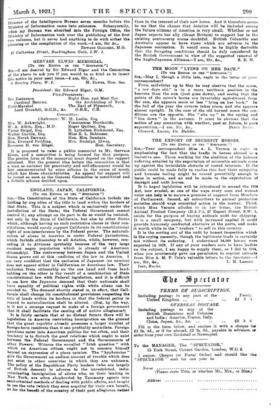ENGLAND, JAPAN, CALIFORNIA.
[To THE EDITOR OF THE " SPECTATOR."] SIR,—The Constitution of the State of California forbids the holding by any alien of the title to land within the borders of that State. This is a subject which is exclusively under the jurisdiction of the State; the Federal Government cannot control it; any attempt on its part to do so would be resisted, not only by the State of California, but also by other States which, although having no such restrictive clause in their con- stitutions, would surely support California in its constitutional right of non-interference by the Federal power. The naturali- zation of aliens in America is under Federal jurisdiction, which forbids citizenship to all Asiatics, while, however, con- ceding it to Africans (probably because of the very large resident negro population which is already of American citizenship). The controversy between Japan and the United States grows out of this . ondition of the law in America. I am very confident that the exclusion of Japanese (eo nomine) does not appear either in Californian or American law. Their exclusion from citizenship on the one hand and from land- holding on the other is the result of a combination of State constitutional law with Federal legislation, and it is difficult to see how the Japanese demand that their nationals shall have equality of political rights with white aliens can bo acceded to. The demand shortly stated is, in effect, that Cali- fornia shall change its constitutional provisions respecting the title of lands within its borders or that the federal policy in regard to naturalization shall be altered. (Bat, by the way, is it not a strange request to make of a foreign government that it shall facilitate the casting off of native allegiance?) It is fairly certain that at no distant future there will be legislation in America restricting immigration on the ground that the great republic already possesses a larger number of foreign-born residents than it can profitably assimilate. Foreign questions enter into American politics far too often, and their tendency is to disturb the good relations which ought to exist between the Federal Government and the Governments of other Powers. Witness the so-called "Irish question " with which an American citizen ought not to concern himself beyond an expression of a pious opinion. The "hyphenates" give the Government an endless amount of trouble which does not exist in other countries in which they are unknown. The policy of the Republican Party leaders (who are largely of British descent) is adverse to the unrestricted. indis- criminating immigration of aliens who, on their landing in New York, are often shepherded by Tammany agents into semi-oriminal methods of dealing with public affairs, and taught to use the vote (which they soon acquire) for their own benefit, or for the benefit of the country of their past allegiance rather than in the interest of their new home. And it therefore seems to me that the chance that Asiatics will be included among the future citizens of America is very small. Whether or not Japan expects her ally (Great Britain) to support her in the existing controversy seems doubtful. British Columbia and Australia appear to hare views which are adverse to the Japanese contention. It would seem to be highly desirable that the foregoing conditions should be duly considered by the British Government in view of the suggested renewal of
the Anglo-Japanese Alliance.—I am, Sir, &a, B. R. H.


































 Previous page
Previous page